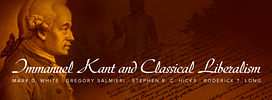In this comment I’d like to focus on one element of Kant’s philosophy and its implications for liberal economic policy.
One kind of classical liberalism argues that liberty is good because individuals need freedom to be productive, trade, and enjoy the results. Property rights are then understood both as a necessary condition for successful economic activity—individuals need to control their productive assets, their trading goods, and their gains from trade—as well as being a recognition of the deservedness of one’s successful economic activity. There is thus a conception justice embodied in liberal economics: it’s just because individuals make and own the results of their choices and actions, for good or bad. Property rights in part embody this conception of economic justice: You get to keep what you earn.
Let us consider the common scenario in which a successful person will make a donation to a worthy cause but will also deflect any praise by saying “I’m only giving back.”
A standard rejoinder is to point out that “giving back” assumes that the giver has taken something from others in the first place—he or she has borrowed or stolen something, and in “giving back” is merely restoring it to its rightful owners. That zero-sum assumption is usually untrue in a market economy, since most donors have earned what they possess. So the claim that one is “giving back” contains within it an injustice: a false accusation of borrowing or theft.
Yet the phrase also denies the benevolence of the giver. If the giver is only giving back what is rightfully someone else’s, then he or she does not deserve any special praise for doing so. “Giving back” thus implicitly contains a double injustice: it implies that the giver does not deserve what the giver has, and it denies the giver any credit for his or her benevolent act.
Now let us return to Kant and his Lectures on Ethics, specifically the lecture titled “Duties to Others.”
Here Kant employs his usual distinction between inclinations and duties: actions done from inclination have no moral worth, while actions done from duty do. What then, Kant asks, does this mean for acts of charity? Charity done out of benevolence has no moral significance, since benevolence is a kind of inclination. By contrast, charity done out of duty has moral significance.
Kant then asks a follow-up question: On what is the duty to be charitable based? Why ought one be charitable, whether one is inclined to or not?
Kant’s answer is that to give charity to the poor is to make good on past injustices. Here is the key quotation. In giving to a person in need of charity, the giver
makes restitution for an injustice of which he is quite unconscious; though unconscious of it only because he does not properly examine his position. Although we may be entirely within our rights, according to the laws of the land and the rules of our social structure, we may nevertheless be participating in general injustice, and in giving to an unfortunate man we do not give him a gratuity but only help to return to his that of which the general injustice of our system has deprived him. For if none of us drew to himself a greater share of the world’s wealth than his neighbor, there would be no rich or poor. Even charity therefore is an act of duty imposed upon us by the rights of others and the debt we owe to them (p. 194).
Thus in Kant we have the first part of the “giving back” claim made explicit: the zero-sum assumption and the consequent implication that one is merely returning something one has borrowed or stolen.
Kant here is indeed Rousseauvian, as per the second part of Rousseau’s Discourse on the Origin of Inequality, and his thought is in keeping with the connections Professor Long makes in his recent comment. Kant’s claim is also congruent with Proudhon’s later “Property is theft” line that is much beloved of the political left.
On the very next page of “Duties to Others,” Kant makes explicit the second assumption of the troubling uses of “giving back”:
A man ought not to be flattered for his acts of charity lest his heart swell with generosity and desire to make benevolence the sole rule of his conduct (p. 195).
Kant therefore denies that charity is properly a matter of benevolence or even of a duty to help the poor meet their needs, as previous thinkers had argued. To my knowledge, Kant is the first to argue that charity is a matter of justice — compensatory justice, to be precise.
This Kantian conception of charity-as-justice is in marked tension with the economic liberalism sketched at the beginning of this comment. If charity is a matter of justice, then there are implications for the role of the state, given that the state is an arbiter and enforcer of justice. In other words, Kant’s twist on the ethics of charity has consequences for those versions of modern political philosophy that see the welfare state as an instantiation of social justice. Kant’s argument in Lectures on Ethics thus undermines at least one classically liberal understanding of justice and property rights.

